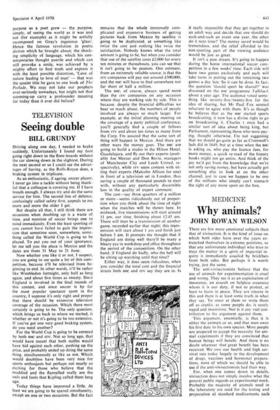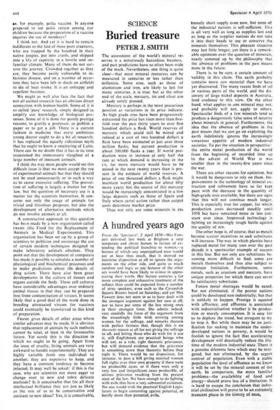MEDICINE
Why animals?
JOHN ROWAN WILSON
There are few more emotional subjects than that of vivisection. It is the kind of issue on which both sides have over the years en- trenched themselves in extreme positions, so that any unfortunate individual who tries to treat the matter in a spirit of impartial in- quiry is immediately assailed by brickbats from both sides. But perhaps it is worth trying, just the same.
The anti-vivisectionists believe that the use of animals for experimentation is cruel and wrong. They see it as an exploitation of innocence, an assault on helpless creatures whom it is our duty, if not to protect, at least to leave in peace. They are sincere in this and there is at least some truth in what they say. To sneer at them or write them off as cranks, as some people do, is surely vapid and insensitive. Nor is it any real con- tribution to the argument against them.
This argument, essentially, is that it is either the animals or us, and that man owes his first duty to his own species. Most people are prepared to accept the necessity for ani- mal experiments if they are convinced that human beings will benefit. And there is no doubt whatever that great benefit has been received. We owe our health and high sur- vival rate today largely to the development of drugs, vaccines and hormonal prepara- tions, none of which we should be able to use if the anti-vivisectionists had their way.
For, when one comes down to details, vivisection does not simply involve what the general public regards as experimental work. Probably the majority of animals used in the laboratory are used for the testing and preparation of standard medicaments such as, for example, polio vaccine. Is anyone prepared to see polio return among our children because the preparation of a vaccine requires the use of monkeys?
I think not. And yet it is hard to remain indifferent to the fate of these poor creatures, who are trapped by the hundred in their native jungles, put into crates, and shipped into a life of captivity in a hostile and un, familiar climate. Many of them do not surl vive the journey. Crowded together as they are, they become easily vulnerable to in fectious disease, and on a number of occas- ions they have been left in sheds on airfields to die of heat stroke. It is an unhappy and repellent business.
We might as well also face the fact that not all animal research has an obvious direct connection with human health. Some-of it is so-called 'pure' research, simply designed to amplify our knowledge of biological pro-, ceases. Some of it is done for purely prestige reasons, to gratify a professor, to publish a paper or to get a job. There is a current fashion in medicine that every ambitious young doctor ought to do a bit of research; it has replaced the equally ridiculous myth that he ought to know a smattering of Latin. There can be no doubt that it has in its time occasioned the unnecessary slaughter of a large number of innocent animals.
I think the way most people would see this difficult issue is that we must accept the use of experimental animals but that they should not be used unnecessarily or in such a way as to cause excessive suffering. The preven- tion of suffering is largely a matter for the law, but the question of necessary use is a matter for the scientists themselves. It con- cerns not only the usage of animals for trivial and frivolous purposes, but also the development of alternative methods which do not involve animals at all.
A constructive approach to this question has been made by a new organisation called FRAME (the Fund for the Replacement of Animals in Medical Experiments). This organisation has been set up by a group of scientists to publicise and encourage the use of certain modern techniques designed to make laboratory animals obsolete. They point out that the development of computers has made it possible to simulate a number of physiological and biochemical processes and to make predictions about tire details of drug action. There have also been great developments in the culture of tissues and organs outside the body. These cell cultures have considerable advantages over ordinary animal tissues in that they can be prepared free from contamination of viruses. It seems likely that a good deal of the work done in breeding attenuated viruses for vaccines could eventually be transferred to this kind of preparation.
FRAME gives details of other areas where similar advances may be made. It is obvious that replacement of animals by such methods cannot be total, at least in the foreseeable future. Yet surely this is the direction in which we ought to be going. Apart from the issue of cruelty, living animals are very awkward to handle experimentally. They are highly variable from one individual to another, they are expensive to keep, and they have a constant tendency to become infected. It may well be asked: if this is the case, why are scientists not more eager to change over to new and mere delicate methods? Is it conceivable that for all their intellectual brilliance they are just as likely as the rest of us to be conservative and resistant to new ideas? Yes, it is conceivable,



































 Previous page
Previous page